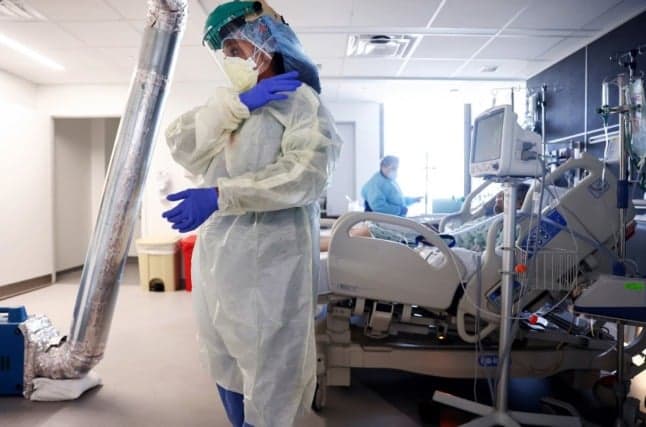Why are most Covid patients in Switzerland foreign nationals?

A significant number of the coronavirus patients currently treated in Swiss hospitals are foreign nationals.
While no official hospitalisation statistics based on nationality have been published in Switzerland, Neue Zürcher Zeitung (NZZ) reported on Sunday that most Covid patients are “people with a migration background” — primarily those returning from visiting their home countries, particularly in the Balkans.
The newspaper based its report on information it received from health professionals and cantonal public health offices.
“In many cases, it is a question of poorly informed people or those who did not have the time or energy to deal with the vaccination procedure. Or they postponed the vaccination until after the holidays in their country of origin”, NZZ said.
Hospitals and health officials are confirming this trend.
“We have a high proportion of patients with a migration background. Some did not want to be vaccinated. Others did not know that they should have been vaccinated", said Hans Pargger, head of the intensive care unit at the University Hospital Basel.
The Thurgau health director Urs Martin also noted that most Covid sufferers in his canton's hospitals are “related to Balkan countries. It was not possible to “communicate successfully with these people regarding vaccination".
"From what I hear from the hospitals, that's a problem”, said Lukas Engelberger, head of the Conference of Cantonal Health Directors.
He added that “many patients come from countries with lax controls, and some traveled with forged certificates”.
In view of this situation, Engelberger said he will propose an “unpopular measure” to the Federal Council: "We must seriously consider reintroducing the entry quarantine."
What is the situation in Swiss hospitals?
As The Local reported on August 19th, “intensive care units in Switzerland have recorded a very strong increase in seriously ill Covid-19 patients”.
On that day, 183 intensive care beds were taken up by coronavirus patients — a vast majority of them unvaccinated. That is a significant spike from August 1st, when only 23 Covid patients were hospitalised in ICUs.
READ MORE: Swiss hospitals: Sharp increase in the number of Covid patients in intensive care
What is the government doing to reverse the trend?
On August 16th, it launched a new “vaccine rhyme” campaign to encourage more people to get immunised.
Its aim is to nudge people to get the jab with a rhyme in three national languages: “Nicht verpassen: impfen lassen” in German, “À ne pas manquer: faites-vous vacciner” in French, and “Non rimandare: fatti vaccinare” in Italian.
READ MORE: Switzerland launches ‘vaccine rhyme’ campaign to boost lagging jab rate
To date, more than 50 percent of the Swiss population has been fully vaccinated.
Comments
See Also
While no official hospitalisation statistics based on nationality have been published in Switzerland, Neue Zürcher Zeitung (NZZ) reported on Sunday that most Covid patients are “people with a migration background” — primarily those returning from visiting their home countries, particularly in the Balkans.
The newspaper based its report on information it received from health professionals and cantonal public health offices.
“In many cases, it is a question of poorly informed people or those who did not have the time or energy to deal with the vaccination procedure. Or they postponed the vaccination until after the holidays in their country of origin”, NZZ said.
Hospitals and health officials are confirming this trend.
“We have a high proportion of patients with a migration background. Some did not want to be vaccinated. Others did not know that they should have been vaccinated", said Hans Pargger, head of the intensive care unit at the University Hospital Basel.
The Thurgau health director Urs Martin also noted that most Covid sufferers in his canton's hospitals are “related to Balkan countries. It was not possible to “communicate successfully with these people regarding vaccination".
"From what I hear from the hospitals, that's a problem”, said Lukas Engelberger, head of the Conference of Cantonal Health Directors.
He added that “many patients come from countries with lax controls, and some traveled with forged certificates”.
In view of this situation, Engelberger said he will propose an “unpopular measure” to the Federal Council: "We must seriously consider reintroducing the entry quarantine."
What is the situation in Swiss hospitals?
As The Local reported on August 19th, “intensive care units in Switzerland have recorded a very strong increase in seriously ill Covid-19 patients”.
On that day, 183 intensive care beds were taken up by coronavirus patients — a vast majority of them unvaccinated. That is a significant spike from August 1st, when only 23 Covid patients were hospitalised in ICUs.
READ MORE: Swiss hospitals: Sharp increase in the number of Covid patients in intensive care
What is the government doing to reverse the trend?
On August 16th, it launched a new “vaccine rhyme” campaign to encourage more people to get immunised.
Its aim is to nudge people to get the jab with a rhyme in three national languages: “Nicht verpassen: impfen lassen” in German, “À ne pas manquer: faites-vous vacciner” in French, and “Non rimandare: fatti vaccinare” in Italian.
READ MORE: Switzerland launches ‘vaccine rhyme’ campaign to boost lagging jab rate
To date, more than 50 percent of the Swiss population has been fully vaccinated.
Join the conversation in our comments section below. Share your own views and experience and if you have a question or suggestion for our journalists then email us at [email protected].
Please keep comments civil, constructive and on topic – and make sure to read our terms of use before getting involved.
Please log in here to leave a comment.